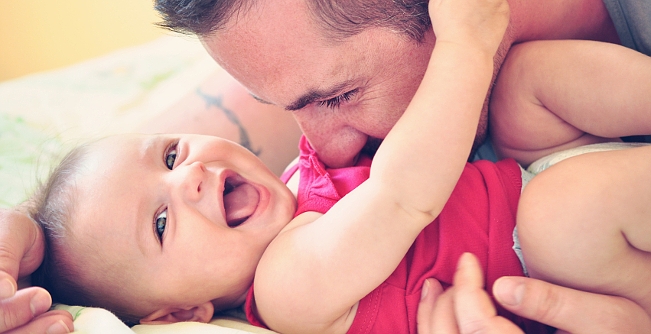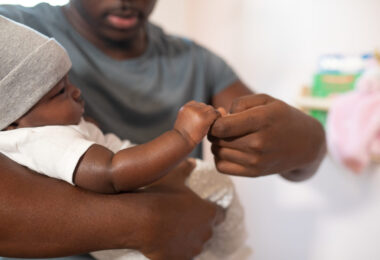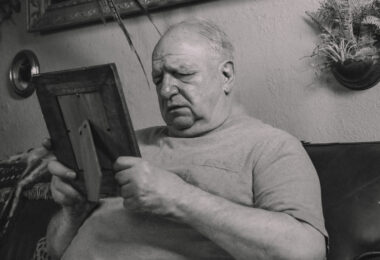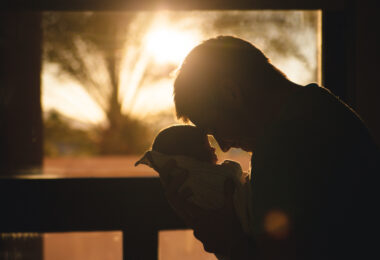You’re a Dad! It’s official – your baby, your creation, has been born. The most exciting and simultaneously terrifying journey of your life has begun.
Although you are likely to have been aware what was coming for the last 8 months, nothing can fully prepare you for bringing your baby home from the hospital.
It is a watershed, “what happens now” moment. Dad’s have described their feelings as; “overwhelmed” and “worried” as they face the “daunting enormity” of having to care for their baby. Below are seven things to help you, your partner and baby get through the first week’s fog of tiredness, cold cups of coffee, dirty nappies and visitors……..
Help your baby adjust to the world
When your baby is born it goes from a safe, secure watery world where noises are muffled to one with bright lights, noises, no boundaries and an array of sights and smells. Your baby will quickly adjust to its environment but to help the transition, keep noises and lights to a minimum. Skin-to-skin time with your baby will enable them to hear your heartbeat and familiarise themselves with your smell which differentiates you from Mum. Swaddles and slings can help babies feel safe as they know their boundaries and replicate the closeness of the womb.
Accept your sleep will be reduced
Although babies sleep on average for 16-20 hours a day this is usually in 2-4 hour windows and as they do not know the difference between night and day, you are just as likely to be awake at 2am as you are 5pm. Invest in a bedside crib which can help maximise sleep for you all by providing constant access to your baby but keeps them safe. Make sure both you and your partner rest as much as you can but never fall asleep with your baby on a sofa or armchair as it increases the risk of SIDS (Sudden Infant Death Syndrome).
Support your partner with feeding
Breastfeeding is something that takes time to learn so encourage and help your partner by using this guide to see if your baby is in the right position. Ensuring your partner has eaten and always has some water to drink whilst feeding will also help. There is often support available nationally and locally and details of helplines and videos from the NHS are listed below. If you are using formula and bottle feeding, you can help by sterilising and preparing feeds as well as giving your baby its feed. A useful guide on preparing formula can be found at https://www.who.int/foodsafety/publications/micro/PIF_Bottle_en.pdf
Prepare yourself for the nappies that change colour
In the first week your baby’s stools will change colour which may understandably cause concern. It is normal and shows all is going well with feeding. The first poo is black and thick like treacle, but becomes looser and is greenish by day 3 or 4. This changes to a yellowy-brown mustard colour due to the milk your baby is digesting. Pictures and more information at https://www.ouh.nhs.uk/women/maternity/postnatal/infant-feeding/documents/nappy.pdf
 Bonding with your baby
Bonding with your baby
Bonding with your baby is essential is promoting their long term physical and emotional health and well-being. The easiest way of doing this is to hold and interact with your baby. They will recognise your voice from the moment they are born, so when they are awake talk to them – about anything. But do it looking into their face as babies can only see about 9 inches when they are first born and will try and make eye contact. Enjoy holding them close and learning what sounds they make.
Support your partner
She will be physically and emotionally recovering from birth as well as dealing with an upsurge in hormones that produce breastmilk whilst suffering a drop in endorphins (think bad PMT). Therefore crying, shouting, needing chocolate and a hug are all very normal. Ensure she is eating and drinking properly, and encourage her to rest as much as possible.
Limit visitors
Of course everyone wants to come and visit the new arrival, but it can be unsettling to newborns to be passed around and held by different people who are unfamiliar, which is often why they can become fretful. Ask family and friends in advance of the birth to phone before turning up and limit visits to an hour. And try to encourage them to bring something that you can heat up for dinner or get them to put a load of washing in whilst they are there. Every bit helps….!
Safe sleep advice can be found at: https://www.lullabytrust.org.uk/safer-sleep
Breastfeeding Support can be obtained from the following sources:
https://www.nhs.uk/Conditions/pregnancy-and-baby/Pages/breastfeeding-help-support.aspx
National Breastfeeding Helpline
0300 100 0212
NCT Breastfeeding Helpline
0300 330 0771








